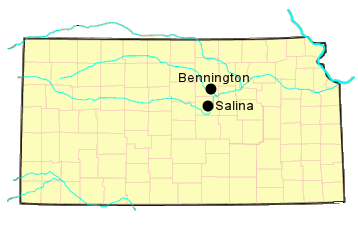| |
Graduating from KU with a degree in literature and philosophy during the 1970’s, Wagner returned to the rural community in which he was raised, where he supported his agricultural adventures by teaching English in area high schools. In addition, he taught himself to play fiddle and guitar on instruments he inherited from his grandparents. Music remains an important and integral part of his life, and the rhythms of folk, bluegrass, and country songs drive many of his lyrical and narrative writings.
Living and working in rural Kansas while still engaging in a meaningful dialogue with academic and urban communities isn’t always an easy achievement, and the isolation and distance from culturally diverse and stimulating encounters leaves gaps in his chosen lifestyle which, ironically, tend to intensify his perceptions of the world around him. “Although I reside in a small town,” he says, “ I live in a fertile valley.”
Working with teenagers is an integral part of that world. “High school students inhabit a dynamic world of dreams and ambitions that is crucial to their lives as grownups,” he says. “Teaching composition and literature to kids who are on the cusp of their adulthood gives me a chance to stimulate their perceptions on what it means to be a human being. I like to ask the difficult questions, the ones that don’t have easy answers, and hopefully foster an investigation and discussion into how and why we live and what our choices and possibilities are as members of the modern world. That’s English.”
Wagner’s love of teaching grew out of an association with great teachers. At KU he had classes with 5 different professors who had won outstanding teaching awards from the university. A Master’s program at Fort Hays State University years later was similar. Many of those teachers left an indelible mark upon him, and although he enjoyed the university environment, the pull of family and land led him back to the rural area where he grew up. “After our first year of farming together and the minimal profit we made, my brother turned to me and quipped, ’One of us is going to have to get a job.’ I’ve been teaching ever since.”
Working with the older breeds of cattle because of their naturally selected survival traits, Wagner has maintained a herd of longhorns since 1990, raising the animals in a natural operation that forsakes intervention and focuses on grass as the primary source of nutrition. In addition, he has recently taken over an established organic grain and hay farm, fitting it in beside the primarily no-till family operation but eschewing the chemical fertilizers and weed control products necessary for modern grain production. “It’s like starting over in agriculture from the 1970’s but taking a different path in terms of seeds, tillage, and production techniques,” he explains. “Organic farming is a story that needs more growing.”
In 2005 Wagner purchased the old Santa Fe train depot in Bennington, moved the structure into the downtown, and set about creating a new life for the 1888 yellow pine building. He and his wife, an artist and brain tumor survivor, currently operate the 3Rivers Studio and Gallery on the site. “I like reusing,” he admits. “The challenge is to renovate creatively without tumbling into a money pit.” More of this story can be found on their website, <3riversgallery.com>.
“It’s important to keep moving within a place and not just to or from a place,” he says, then grins. “There’s no place like home.”
---Biographical contribution submitted by author, Don Wagner.
Return to Don Wagner
Return to Top of Page |
|



